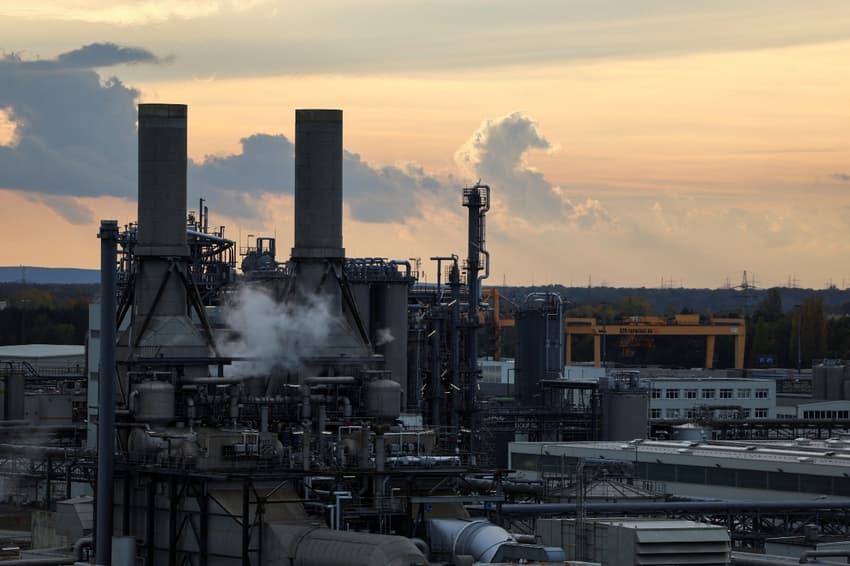German chemical giant to slash jobs due to high energy costs

German chemical giant BASF said Friday it would cut thousands of jobs worldwide and close several units at its historic home in Ludwigshafen as it contended with sharply increased energy prices.
"High energy prices are now putting an additional burden on profitability and competitiveness in Europe," BASF CEO Martin Brudermüller said in a statement.
Brudermüller also criticised European "overregulation, slow and bureaucratic permitting processes".
In response, BASF aimed to save €500 million a year in non-production areas by the end of 2024, including a net loss of "around 2,600 positions", the group said.
A further 200 million euros would be shaved off by the end of 2026 with the closure of production facilities at its site in Ludwigshafen, in southwest Germany.
This would include the shutting of an energy-intensive ammonia plant and related facilities for the production of fertilisers.
READ ALSO: German retailer Zalando to cut 'hundreds of jobs'
The measures will also lead to the loss of around 700 production jobs in Ludwigshafen, which employs around 39,000 people, but Brudermüller said he was confident "most of the affected employees" could be relocated to other plants.
In 2022, BASF confirmed a net loss of €627 million, less than the figure of €1.4 billion initially announced in January.
Sales rose by 11 percent to €87 billion, while operating profit amounted to €6.9 billion before extraordinary measures, a drop of around 12 percent.
Russia's invasion of Ukraine, launched a year to the day, was followed by a rapid increase in the cost of energy as Moscow dwindled gas supplies to Europe.
BASF had previously written off 1.1 billion euros as a result of the abandonment of the Nord Stream 2 gas pipeline from Russia to Germany, which was backed by loans from Wintershall Dea.
The group had warned that reduced gas flows from Russia and high prices would force it to idle parts of its production, with the chemicals sector a major consumer of the fuel.
Germany -- like many of its European neighbours -- had been highly reliant on imports from Russia to match its energy needs.
READ ALSO: German software giant SAP to cut 3,000 jobs
Comments
See Also
"High energy prices are now putting an additional burden on profitability and competitiveness in Europe," BASF CEO Martin Brudermüller said in a statement.
Brudermüller also criticised European "overregulation, slow and bureaucratic permitting processes".
In response, BASF aimed to save €500 million a year in non-production areas by the end of 2024, including a net loss of "around 2,600 positions", the group said.
A further 200 million euros would be shaved off by the end of 2026 with the closure of production facilities at its site in Ludwigshafen, in southwest Germany.
This would include the shutting of an energy-intensive ammonia plant and related facilities for the production of fertilisers.
READ ALSO: German retailer Zalando to cut 'hundreds of jobs'
The measures will also lead to the loss of around 700 production jobs in Ludwigshafen, which employs around 39,000 people, but Brudermüller said he was confident "most of the affected employees" could be relocated to other plants.
In 2022, BASF confirmed a net loss of €627 million, less than the figure of €1.4 billion initially announced in January.
Sales rose by 11 percent to €87 billion, while operating profit amounted to €6.9 billion before extraordinary measures, a drop of around 12 percent.
Russia's invasion of Ukraine, launched a year to the day, was followed by a rapid increase in the cost of energy as Moscow dwindled gas supplies to Europe.
BASF had previously written off 1.1 billion euros as a result of the abandonment of the Nord Stream 2 gas pipeline from Russia to Germany, which was backed by loans from Wintershall Dea.
The group had warned that reduced gas flows from Russia and high prices would force it to idle parts of its production, with the chemicals sector a major consumer of the fuel.
Germany -- like many of its European neighbours -- had been highly reliant on imports from Russia to match its energy needs.
READ ALSO: German software giant SAP to cut 3,000 jobs
Join the conversation in our comments section below. Share your own views and experience and if you have a question or suggestion for our journalists then email us at [email protected].
Please keep comments civil, constructive and on topic – and make sure to read our terms of use before getting involved.
Please log in here to leave a comment.